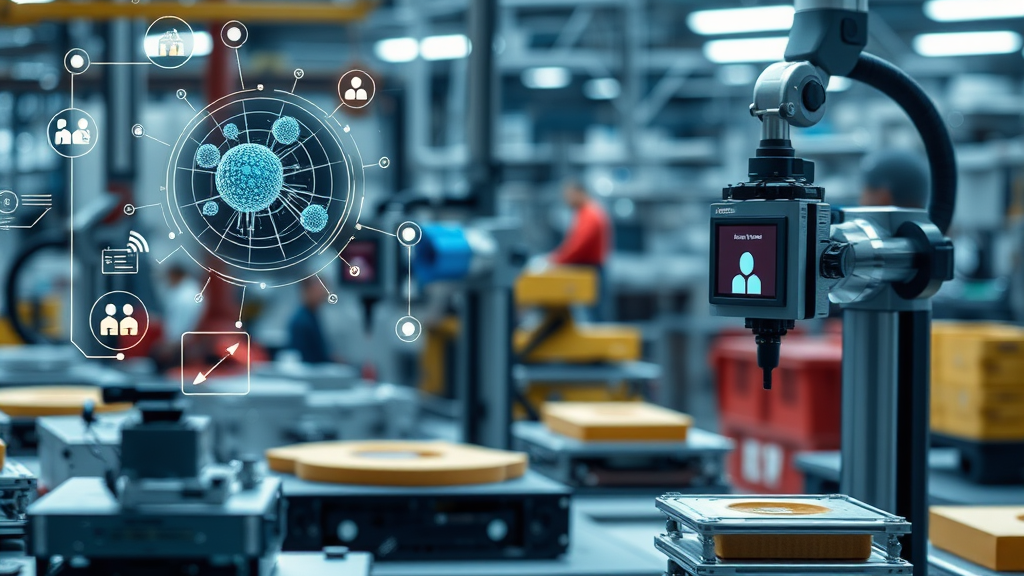In the realm of manufacturing, industrial QC lighting techniques play a critical role in ensuring product quality and consistency. These techniques are essential for industry QA professionals who are responsible for maintaining high standards in the production process. By implementing effective lighting solutions, manufacturers can detect defects, enhance precision, and improve overall efficiency.
The importance of industrial QC lighting techniques cannot be overstated. In the initial phases of quality control, proper lighting is crucial for identifying imperfections that may not be visible to the naked eye. This article delves into various lighting techniques and their applications in industrial quality control, providing valuable insights for industry professionals.

Understanding the Basics of Industrial QC Lighting
Quality control in industrial settings often involves visual inspection, where lighting is a key component. Proper lighting ensures that inspectors can accurately identify and assess defects. Here, we explore the fundamental aspects of QC lighting.
The Role of Lighting in Quality Control
Lighting serves as the backbone of visual inspection processes. It enhances visibility, allowing inspectors to detect anomalies such as surface blemishes, color discrepancies, and dimensional inaccuracies. Without adequate lighting, these defects might go unnoticed, leading to compromised product quality.
Types of Lighting Used in QC
Various types of lighting are employed in quality control, each serving a specific purpose. Common types include ambient lighting, task lighting, and accent lighting. Each type offers unique benefits and is chosen based on the inspection requirements.
Advanced Industrial QC Lighting Techniques
Beyond basic lighting, advanced techniques have been developed to address specific quality control challenges. These techniques leverage cutting-edge technology to provide enhanced inspection capabilities.
Stroboscope Lighting
Stroboscope lighting is a powerful tool in industrial QC. By flashing light at specific frequencies, it enables inspectors to observe moving parts as if they were stationary. This technique is particularly useful in industries like automotive, where precise part alignment is critical. For more on this, visit Automotive Part Testing.
LED Lighting Solutions
LED lighting has revolutionized industrial QC by offering energy-efficient and customizable lighting solutions. LEDs provide consistent illumination, improving the accuracy of inspections. They also have a longer lifespan compared to traditional lighting, reducing maintenance costs.
Implementing Effective QC Lighting Strategies
To maximize the benefits of industrial QC lighting, manufacturers must adopt effective strategies tailored to their specific needs. Here, we discuss key considerations for implementing successful lighting solutions.
Assessing Lighting Requirements
Before implementing QC lighting, it is essential to assess the specific requirements of the inspection process. Factors such as the type of products, inspection area, and inspector preferences must be considered to ensure optimal lighting conditions.
Customizing Lighting Solutions
Customizing lighting solutions to suit the unique demands of each inspection process can significantly enhance quality control outcomes. This involves selecting the appropriate lighting type, intensity, and positioning to achieve the desired results.
Challenges and Solutions in QC Lighting
While industrial QC lighting offers numerous benefits, it also presents certain challenges. Understanding these challenges and implementing solutions can help manufacturers overcome potential obstacles.
Dealing with Glare and Shadows
Glare and shadows can hinder the inspection process by obscuring defects. To mitigate these issues, manufacturers can employ diffused lighting, which provides even illumination and minimizes glare.
Maintaining Consistent Lighting Conditions
Consistency in lighting conditions is crucial for accurate inspections. Fluctuations in lighting can lead to inconsistent results. Implementing automated lighting controls can help maintain stable lighting conditions and improve inspection reliability.
The Future of Industrial QC Lighting
As technology continues to evolve, so does the future of industrial QC lighting. Emerging trends and innovations are set to revolutionize the field, offering new possibilities for quality control.
Integration of Smart Lighting Systems
Smart lighting systems, which integrate sensors and automation, are becoming increasingly prevalent in industrial QC. These systems can adjust lighting conditions in real-time, optimizing inspections and enhancing efficiency.
Adoption of AI-Powered Lighting Solutions
AI-powered lighting solutions are on the horizon, promising to transform QC processes. By leveraging artificial intelligence, these systems can adapt to changing inspection requirements and provide intelligent lighting adjustments.
Conclusion
Industrial QC lighting techniques are indispensable for ensuring product quality and consistency in manufacturing. By understanding the various lighting techniques and strategies, industry QA professionals can enhance their quality control processes. The future of QC lighting holds exciting possibilities, with advancements in smart and AI-powered lighting systems set to elevate the field to new heights. For a deeper understanding of stroboscope lights and their significance, visit Stroboscope Lights.

FAQs
What is the role of lighting in industrial QC?
Lighting is crucial in industrial QC as it enhances visibility, allowing inspectors to detect defects and ensure product quality.
How does stroboscope lighting work?
Stroboscope lighting works by flashing light at specific frequencies, enabling inspectors to observe moving parts as if they were stationary. Learn more about its applications in Alignment Check.
What are the benefits of LED lighting in QC?
LED lighting offers energy efficiency, consistent illumination, and a longer lifespan, making it an ideal choice for QC inspections. Discover more about LED Stroboscopes.
This article contains affiliate links. We may earn a commission at no extra cost to you.
